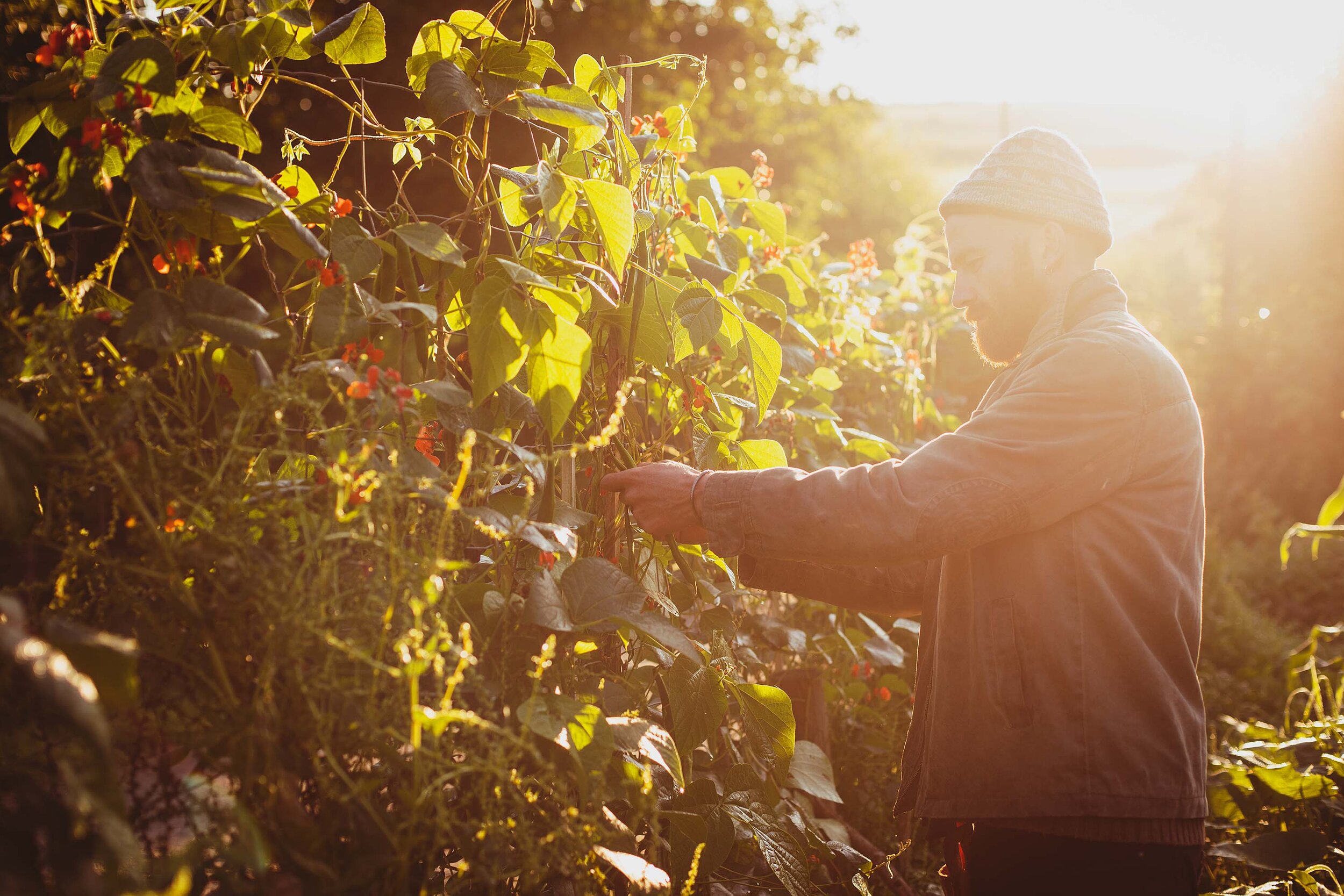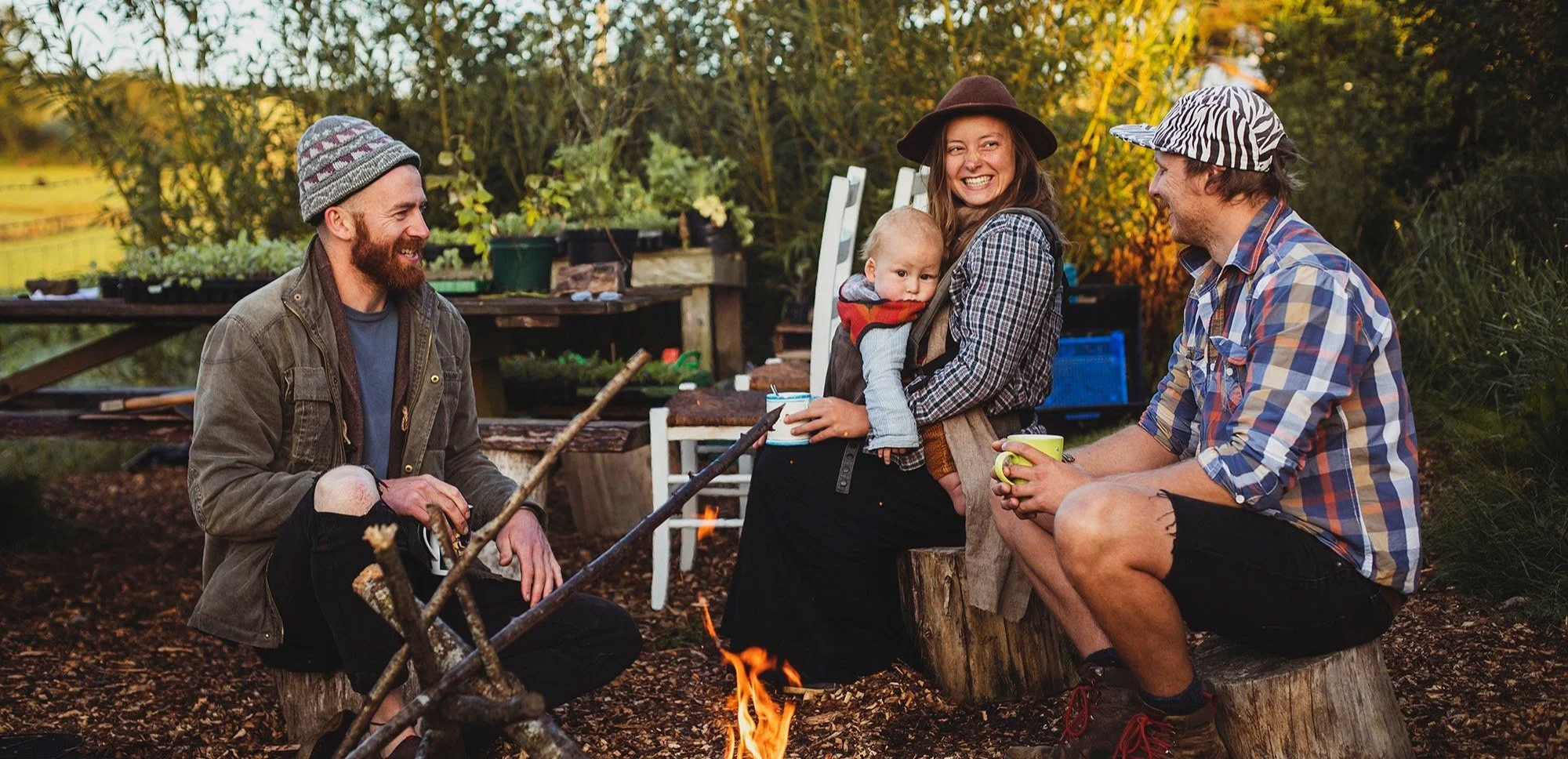Our Story
Glasbren, the Welsh language word for ‘Sapling’, a young tree, is a non-profit social enterprise, working to reimagine our local food systems, rewild the way we eat, live and grow, and regenerate our communities, the people who live in them and the land we depend on.
We believe that growing food together is a powerful way for us to breathe new life into our relationship with the living world. Food binds us to our soil, seed and our local land. It could be a vehicle for an authentic place-based culture and resilient, supportive communities. It also empowers us to heal ourselves and our planet in the face of climate chaos and biodiversity collapse.
We are fired-up, passionate and driven to do what we can to create a island of peace and biodiversity, a thriving, supportive community of practice and a regenerative, productive, highly diversified people-facing farm.
“What shines through is the love and respect these people have for the land and for the people learning’”
We supply our CSA members & low-income families with a weekly share in the harvest, welcome volunteers, host courses, workshops and seasonal community events and support community growing & regeneration in a variety of ways.
We are a community-interest company (CIC) led by the ethics of Permaculture - earth care, people care and fair share - and the principles of agroecology and food sovereignty. We are also a proud member organisation of the Landworkers Alliance, a grassroots union of small-scale peasant farmers and land-based workers in the UK.
Why we grow
Our governments have declared a Climate Emergency. Wildfires rage out of control like we’ve never seen, and storms and flooding cause devastation all over the world - not least here right here in the valleys of the Taf & Tywi rivers. Modern industrial farming continues to degrade soils, deforest large swathes of land, pollute rivers and watercourses and threaten the livelihoods of small-scale farmers. The global food system is the single largest contributor to carbon emissions. What’s more, in 2020 the UK officially left the European Union, casting a shadow of uncertainty over our food security and food standards.
And then came COVID-19. The Pandemic brought everything to a grinding halt. Fear & illness stalked our communities and the systems and society we took for granted were exposed for their fragility. But it also invited us to stop, be still, find refuge in the natural world around us and gave us a new appreciation for our essential workers, and for local, resilient food supply chains that can be relied on to provide healthy, nutritious food to help build immunity and fight off the virus.
No one knows yet what the future holds, but what we do know is that we need greater agency in our communities, to know where our food comes from and to revitalise and regenerate rural communities with small-scale farms at their heart. Now more than ever, small, ecological, peasant farms are perfectly positioned to meet the needs of an uncertain future, build community and networks of solidarity and mutual aid, promote health and as a small, local response to both local and global issues.
“Can’t thank you enough for bringing so many long-awaited changes to our frazzled way of life”
“Glasbren is a an image of sustainable agriculture, benefiting both the wellbeing of volunteers and natural biodiversity”
Six years ago, our founder, Abel, started to make steps towards creating an ecological market garden at Bronhaul Farm, the land where he grew up - a place that would grow lots of nutritious food to feed the community, but that also would be a healing place for those who need it and a habitat for lots of insects, birds and soil life. We also became a team, with Steff, Luisa, Rose, Sophie & Tom, and too many volunteers, friends and supporters to count, all playing a big part in getting to where we are today!

There, we grew a range of over 30 vegetables, tree crops and perennial foods in our 1.5 acre market garden and polytunnels using agroecological techniques, regenerative methods and the principles of permaculture design. The garden was shaped over 5 seasons from a steep, degraded pasture into a thriving, abundant edible landscape, with careful attention to water retention & storage, soil building, habitat creation, tree planting, composting systems and using the natural shapes and lines of the landscape. We tried to demonstrate how, with intelligent design & key regenerative growing techniques, marginal, sub-optimal land can be used to grow a huge quantity and diversity of food, whilst also sequestering carbon, nurturing wildlife and creating long, term, sustainable food systems.
Join us for a tour around our original agroecological market garden every month throughout 2023….
“This is one of the best examples of no dig gardening I’ve seen, and as home growers and vegetable gardeners we can take inspiration from places like these and apply them to our own food growing projects. ”
We are in our fifth year of running our fledgling Community Supported Agriculture (CSA) veg box scheme, volunteer programmes and opportunities, schools’ growing programmes, courses and workshops in sustainable living and food growing. Through the pandemic, we developed solidarity veg box schemes to support low-income households and those experiencing unexpected food insecurity, and worked with the Landworkers Alliance and the TGrains project at UWE Bristol to explore the role CSA farms could play in affordable local food and improving diet and health. Working with the Welsh Council of Voluntary Action (WCVA) and CAVS (Carmarthenshire Association of Voluntary Services) we were able to develop our volunteer programmes, and create a safe, inclusive, responsive environment for folks on a mental health journey to come and heal, learn and find purpose as part of a welcoming community of practice.
We were one of five farming projects to be selected to pilot a new Horticulture Small Capital Grants scheme with Social Farms & Gardens, Peas Please and Food Sense Wales - the results of which fed into the first Horticultural support schemes being launched by Welsh Government. Through the Winter fuel crisis, we partnered with Carmarthenshire County Council to offer free workshops to help low-income individuals learn how to grow food, food literacy and vital cooking skills for eating seasonally, healthily and affordably.
Thanks to the National Lottery Community Fund and the Community Foundation Wales, we were also able to offer free day workshops, all around building skills for self-reliance, wellbeing and regeneration. We have always been so passionate about breaking down barriers to accessing land, nature, permaculture education and practical skills in sustainability, and over these years have understood what those barriers are and think we have good solutions to go forward with. We now operate entirely in the gift economy, so all workshops, courses, veg boxes and paid opportunities are offered on a sliding scale, paying what is affordable within a certain range. We feel that this is the best way to share the wealth and create a truly sustainable and fair circular economy.
We’ve run food heritage and food pop-up events as well as the annual Seedy Saturday Carmarthen, a festival to celebrate seed saving, seed sovereignty and to bring the local growing and sustainability community together. We now also offer support to other community food projects and emerging regenerative farms - funding, mentorship, training and design services - to help replicate and grow what we’ve learnt and achieved. We have a finger on the pulse of the local movements for sustainable food systems and affirmative action for nature, and have contributed a voice to podcasts, print and video media and national news advocating for change.
The next chapter….go big or go home!
In 2023, an opportunity came up that we simply couldn’t ignore - to apply to become the new long-term steward of 134 acres of coastal National Trust land just a few miles south in Llansteffan, Parc yr Arglwydd | Lords Park farm.
Glasbren was at a crossroads. Conscious of the urgency of climate change, biodiversity collapse and our place at the convergence of many of the issues of our times, we were looking to replicate and scale what we are doing on a new, larger site to meet a growing need.
Wales grows a meager 3% of the veg it consumes, and there is growing demand in the Carmarthenshire region in the private and public sector for local, agroecological, nutrient dense veg. People are increasingly looking to nature and the land to heal after the pandemic, and in the face of climate change, are seeking skills and a sense of empowerment to take local, positive action for the planet and deepen their relationship to nature.
Parc yr Arglwydd | Lords Park farm
“Lords Park Farm will be an example of nature friendly farming farm where a farming system is maintained and managed in a way that benefits the land and the wildlife that inhabit it but has the ability to be enjoyed by more people.”
We believe that we have a vision for how farms like Lord’s Park can meet these needs for the local area, and the region, as a beacon for a new way to think of and use farms for the good of the community, the land and the planet.
It is a vision for a highly diversified, people-focused, ecologically-rich farm, a hub of community food and a centre for wellbeing and regenerative education. Placing people of all ages at the heart of what we do, we’ll teach nature skills, regenerative land practices and work to shape attitudes, ecological perspectives and pro-environmental behaviours. We’ll restore healthy links between the community and the land, honour the heritage, history and spirit of Lords Park & its broader landscape and invest in many ways in its preservation and regeneration.
We applied on the strength of our experience, networks in the area, our community support, and particularly on our carefully thought-out, long-term regenerative vision for this place we’ve come to love - and couldn’t be more elated that we have been given this opportunity to grow Glasbren into a bright future.
Will you join us?









